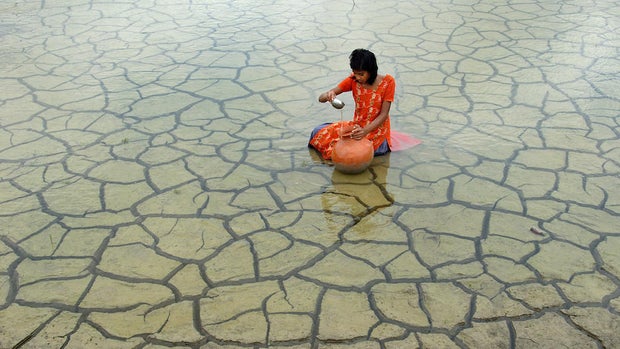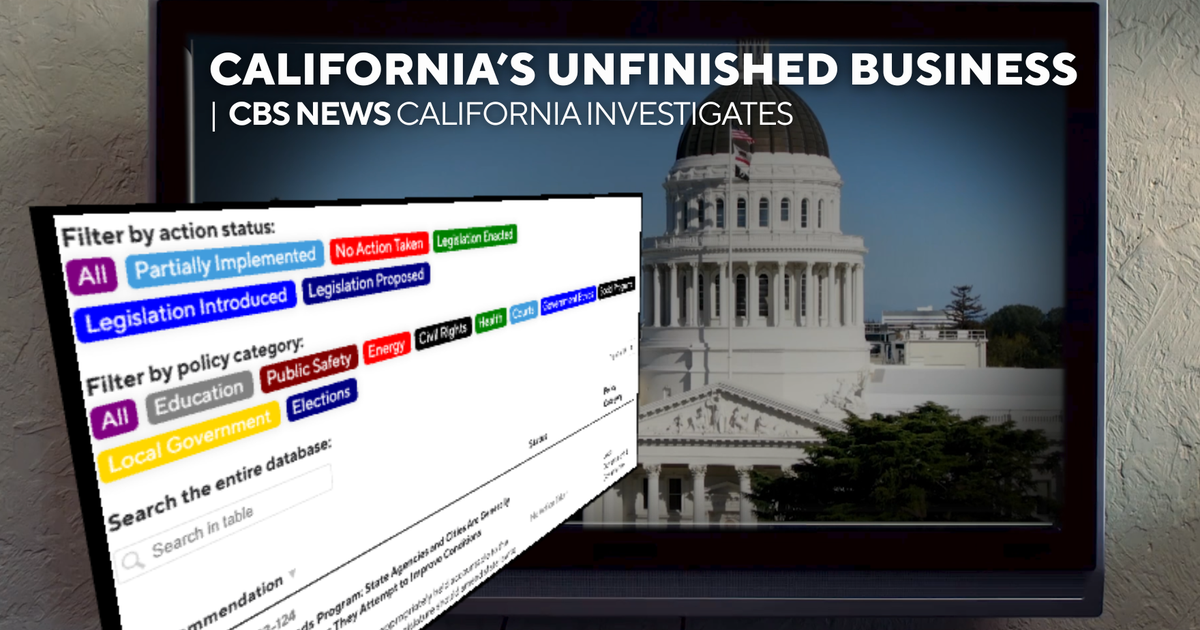"We are at a crossroads": House Democrats release plan to address climate crisis
It's been about five decades since the passage of meaningful federal environmental protections in the United States, like the Clean Air Act and Clean Water Act. On climate change, other than executive actions during the Obama administration, policy action has been virtually nonexistent.
However, recent polling shows most American want to see federal action on climate. A Pew Research survey published just last week found two-thirds of Americans, including more than half of Republicans, think the government should do more on climate change. And a CBS News poll last fall found two-thirds think action is needed right now.
After Democrats regained control of the House of Representatives in the 2018 election, they created the House Select Committee on the Climate Crisis to lead the way. Now, after a year and a half of work, the committee released a comprehensive report Tuesday aiming to chart the U.S. course toward solving this existential problem.
The Select Committee Democrats' Climate Crisis Action Plan is a 500-page guide with hundreds of policy recommendations for how the federal government can move forward.
The plan focuses on fusing climate solutions with economic growth and job creation, laying out 12 key pillars like investing in infrastructure, developing renewable energy, building resilience to climate impacts, and prioritizing environmental justice.
The chair of the committee, Representative Kathy Castor of Florida, told CBS News, "Climate solutions are economic solutions. Solving the climate crisis means putting Americans back to work in clean energy jobs that will grow our economy."
"The United States must harness the technological innovation of the moonshot, the creativity of our entrepreneurs, the strength of our workers, and the moral force of a nation endeavoring to establish justice for all," the report states.
The Climate Crisis Action Plan sets an ambitious goal of net-zero carbon emissions by 2050. In a net-zero scenario, emissions are still produced, albeit in much lower quantities, but an equivalent amount is absorbed or removed so there is no overall increase in the amount of heat-trapping greenhouse gases in the atmosphere.
The nonpartisan think tank Energy Innovation analyzed a subset of the recommendations and found the measures would prevent 62,000 premature deaths annually by 2050 and provide $8 trillion in climate and health benefits by 2050.
Central to the plan are proposals to build cleaner electricity, transportation, construction and manufacturing sectors.
Electricity
The plan calls for enacting a Clean Energy Standard to help with decarbonization, ensuring that the mix of fuel used by local utility companies to keep your lights on would be composed of more renewable energy sources like wind and solar. The plan would provide grants and incentives to help the process along, with the aim of achieving net-zero emissions in the electricity sector by 2040. The analysis by Energy Innovation estimates the Clean Energy Standard would create roughly 530,000 jobs annually.
Transportation
The plan would set tougher emissions standards for cars and heavy-duty trucks — standards the Trump administration has watered down. The plan sets a goal of having all new cars be zero-emissions by 2035 and trucks by 2040, while building out the necessary infrastructure like charging stations.
Construction
The plan would incentivize local governments to adopt updated building codes to make existing structures more energy efficient. It aims for all new residential and commercial buildings to be net-zero emissions by 2030.
Manufacturing
The plan would establish performance standards for industrial facilities and set new standards to reduce leakage and cut pollution from America's oil and gas infrastructure.
The report also vows to "rebuild U.S. industry for global climate leadership" by investing in domestic manufacturing of clean energy and zero-emission technologies, dramatically increasing federal investment in carbon removal development, and offering incentives, loans and grants to bolster manufacturing.
Environmental justice and support for workers
Along with its many specific goals and policy proposals, the report places a special emphasis on environmental justice. This is vital, Castor says, because communities of color and low-income families have long been disproportionately impacted by environmental crises — a fact which has been laid bare by COVID-19.
"We've seen this during the coronavirus pandemic, which has claimed too many Black and Brown lives in communities across America that are exposed to higher levels of air pollution," she said.
The committee seeks to address those disparities by planning for investment in overburdened communities, and by cutting pollution and strengthening enforcement of environmental laws in those communities. The plan stresses that community members must be included in the policymaking process.
"We cannot ignore one crisis as we solve another. We must make sure climate solutions have justice and equity at their core," says Castor.
Labor issues are also addressed in the report, which recognizes the right of workers to organize and negotiate higher wages and working conditions. It would establish a National Economic Transition Office to assist workers who may be displaced by the sustainable energy transition.
Scientific integrity
Another priority outlined in the report is strengthening federal support for climate science research and safeguarding scientific integrity — clearly a response to what has been viewed by many critics as a war on climate science (and science in general) on the part of the Trump administration.
Is there common ground?
Joseph Majkut, director of climate policy at the Niskanen Center, a nonpartisan think tank that describes itself as having a "free market, climate realist perspective," is wary that the committee's plan may be overly ambitious and increase government influence over energy markets, consumer choices and the economy. Majkut says, "That will repulse Republicans wary of a large administrative state, even if they are increasingly interested in pursuing climate action."
Instead, the Niskanen Center favors a more narrow approach centered around a carbon tax. "To chart a course of high climate ambition and small government, mechanisms like a carbon tax are necessary. Governments do a lot to shape markets and a carbon tax would allow market actors to decide when, where, and how to best reduce greenhouse gas emissions," explained Majkut.
Along those lines, the House Democrats' plan does suggest employing market-based solutions through financial instruments like putting a price on carbon and offering tax credits, grants and loans to manufacturers producing clean energy products. However, the plan goes further in eliminating what it calls "unnecessary" tax breaks for oil and gas companies — an idea likely to encounter Republican resistance.
The prospects for action are complicated by the fact that climate change has become the most deeply polarizing issue in the nation. While nearly 80% of Democrats believe climate change should be a top priority for Congress and the president, only 1 in 5 Republicans feels the same.
But Representative Castor insists, "There's nothing partisan about solving the climate crisis and moving to a clean energy economy that puts families and workers first. There's nothing polarizing or controversial about ensuring our children can breathe clean air. There's nothing polarizing about helping homes and small businesses withstand the next disaster."
Some elements of the committee's plan seem uncontroversial, such as combating food waste (up to 40% of food produced in America is wasted) and supporting farmers' and ranchers' voluntary climate stewardship through regenerative agriculture.
Another area of possible agreement, according to the Niskanen Center, is infrastructure — community resilience projects aimed at minimizing the impacts of climate change and investing in projects to limit greenhouse gases in the atmosphere.
"As we look at the next Congress, I would expect even more interest in building out the technology and infrastructure necessary for decarbonization. These programs gain bipartisan support because they are generally low-cost compared to the benefits they bring and can achieve results relatively quickly," Majkut said.
Bipartisan agreement might also extend to natural solutions highlighted in the report, such as restoring wetlands and forests, and planting more trees to absorb carbon dioxide — like the trillion trees proposal unveiled by Republicans in February. However, critics note that tree-planting alone is not sufficient, and fails to tackle climate change at its root cause, the burning of fossil fuels.
The House Democrats' Climate Crisis Action Plan goes further, imposing a moratorium on new fossil fuel leases on public lands and offshore leasing. It also aims to protect at least 30% of all U.S. lands and ocean areas by 2030.
Jerry Taylor, president of the Niskanen Center, says even if Democrats manage to win the Senate and White House in November, it's unclear whether they'd be able to enact their ambitious climate agenda.
"It's difficult to know in advance how the GOP would respond to a defeat in November, if it comes. They may very well be tempted to dust off their 2009 playbook, in which House and Senate Republicans took a position of near-absolute and unyielding opposition to everything coming out of the Democratic Party and the Obama administration," he said.
On the other hand, Taylor feels there may be a half a dozen Republicans in the Senate willing to offer support on climate policy. And with the ballooning deficit as a result of the COVID-19 pandemic, the need for government revenue might be enough motivation to yield agreement on a carbon tax.
As the consequences of climate change continue to mount — consequences seen everywhere from the warming Arctic to the growing U.S. flood zones — Castor believes Congress must not delay action any longer.
"The science is telling us that we are at a crossroads. We can't afford to keep waiting to act on climate. What we choose to do — or not do — will shape the future for current and future generations."




